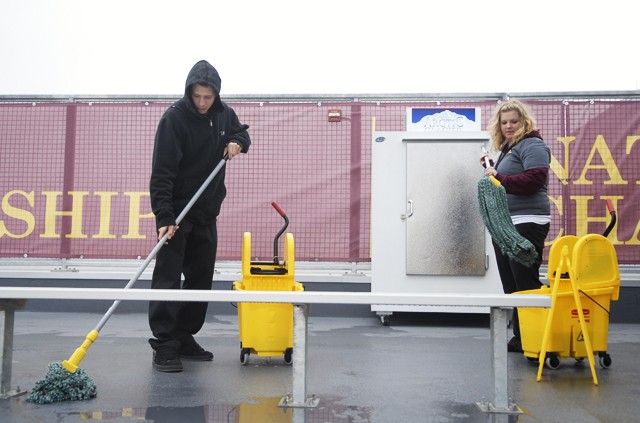For a group of University of Minnesota students, game day started at 5 a.m. Saturday and it didnâÄôt involve any tailgating. Instead, these twenty students head to the stadium clutching coffee and energy drinks to begin their work as building supervisors at TCF Bank Stadium. The students begin their morning by meeting with Stadium Operations Director Derek Hillestad six hours before kickoff to discuss the dayâÄôs tasks. âÄúLetâÄôs finish it off on the right note,âÄù Hillestad said. âÄúLetâÄôs leave everyone with a good impression of the stadium.âÄù The student supervisors âÄî known as âÄúblack shirtsâÄù around the stadium âÄî oversee about 40 general student workers, or âÄúgrey shirts,âÄù Hillestad said. At 5:15 a.m. the supervisors headed out to do first walk-through inspections. As they patrolled the stadium, they created âÄúhit listsâÄù of tasks for the grey shirts to do when they arrived at 6:30 a.m. David Nelson , an applied economics senior, inspected the DQ Club Room on the third floor of the stadium with sophomore colleague Jeremiah Schadegg . The crew is made up mostly of seniors, making Schadegg one of the few the students workers who will return next year. Stadium operations supervisor Brittany Wier said being a student is a requirement for the positions because it is a way to keep the stadium campus-based. âÄúItâÄôs more to give the students employment opportunities and [to try] to keep it in the University,âÄù Wier said. âÄúThere are always students in need of rent money, if not rent money âÄî bar money.âÄù Students work 12-hour shifts on game days, Nelson said. By 6 a.m., his hit list already included scrubbing bathroom floors, cleaning up a peanut spill, rearranging furniture and stocking closets with cleaning supplies. Reporting leftover window smudges and un-polished garbage cans over her radio, Wier, the night manager for the weekend, walked through the entire stadium numerous times Saturday. After the football game, the student workers started âÄúflipping and tearingâÄù different parts of the stadium. The process involves converting a space in the stadium for an event besides football. The DQ Club Room was one area of the stadium the students got to work on almost immediately after the game ended. By 7 p.m. Saturday, the room had been set up with rows of chairs and a stage for a Tuesday TCF Bank meeting. Wier took the last walk-through of the night, making one final check that lights were off, chairs were stored and doors were locked. She returned to the stadium at 5:45 a.m. Sunday to oversee last-minute clean up. Hillestad said the team must have the stadium at its cleanest, by 7 a.m. Sunday for a recruitment breakfast and a banquet scheduled later in the day. Tweaking and fine-tuning Associate Athletics Director Phil Esten said the operations team expected problems with a new stadium âÄî they just didnâÄôt know what they would be. âÄúYou donâÄôt know what you donâÄôt know,âÄù he said. Esten said both the stadium operators and the fans learned more each game. âÄúComing to a facility for the first time âÄî any time you go anywhere for the first time âÄî itâÄôs just new and it takes longer and the next time you do it itâÄôs a little bit easier,âÄù he said. âÄúI think that by our seventh game this weekend, we certainly havenâÄôt perfected it, but weâÄôre getting pretty close.âÄù Problems such as long gate and concession lines had to be solved earlier in the season. Two more gates, opening access to the stadium a half hour earlier, more portable concession stands and walking concession sellers became the solutions, Esten said. Hillestad said his crew established more restrictive elevator protocols and adjusted the number of ticketing staff at gates to facilitate more efficient transportation to, from and inside the stadium. Operations ran smoothly Saturday. Hillestad said the day brought in about five radio inquiries from supervisors, whereas the first home game on Sept. 12 had about 25. Complaints from nearby neighborhoods about the noise reverberations were addressed by turning down the volume after the second game, Esten said. âÄúWho could have guessed that in a neighborhood a couple of miles away, in the St. Anthony Park neighborhood , that they were going to hear the speaker system more prevalently than you would a block away from the stadium?âÄù The sound system is one aspect of the stadium that will be investigated during the offseason by looking at other possible positioning of the speakers, Esten said. The team will also use the off-season to prepare for any pre-game snowfall next year with a mock snow removal exercise, Hillestad said. âÄúWeâÄôve finally started to change the culture a little bit of Gopher football,âÄù Esten said âÄúThe experience itself is more than just about winning and losing, and I feel like thatâÄôs what it was at the Metrodome ,âÄù. -Raghav Mehta and Danielle Nordine contributed to this report

Image by Jason Kopp
University of Minnesota students and general student workers for TCF Bank Stadium Jeremiah Schadegg, left, and Katie Gullifer mop up a spill before the football game Saturday.
The Early Shift
A group of University of Minnesota students showed up at 5 a.m. Saturday to help get TCF Bank Stadium ready for gameday.
Published November 15, 2009
0

